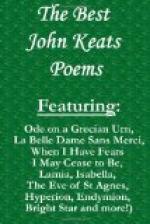|
This section contains 4,225 words (approx. 15 pages at 300 words per page) |

|
SOURCE: Bewell, Alan J. “The Political Implication of Keats's Classicist Aesthetics.” Studies in Romanticism 25, no. 2 (summer 1986): 220-29.
In the following essay, Bewell suggests that Hyperion reflects Keats's uncertainty of his own political voice, and should instead be read as a poem concerned with the aesthetics of sculptural form.
“If I weren't a conqueror, I would wish to be a sculptor”
—Napoleon
Few would disagree that Keats's Hyperion, with its depiction of the overthrow of Saturn by the Olympian gods, of one form of power and sovereignty being displaced by another, has something to do with politics, especially with the French Revolution and its impact upon English political life. Nor would many question the assertion that the poem is concerned, above all, with aesthetic change, the life and death of sculptural forms. Indeed, one of the unique aspects of Keats's representation of the Titans is that they never fully...
|
This section contains 4,225 words (approx. 15 pages at 300 words per page) |

|


